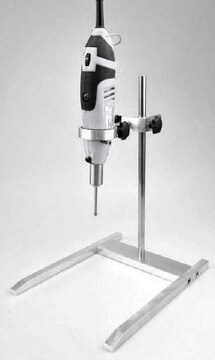Z359963
Pellet pestles
CTFE/stainless steel (Reusable, Autoclavable)
Synonym(s):
749515-0000, Laboratory Pestles, Pellet Grinder, Pestle for Pellets
Sign Into View Organizational & Contract Pricing
All Photos(1)
About This Item
UNSPSC Code:
41121800
eCl@ss:
32080115
NACRES:
NB.22
Recommended Products
material
CTFE/stainless steel (Reusable, Autoclavable)
description
Fits 1.5 mL microcentrifuge tube
manufacturer/tradename
Kimble®
Looking for similar products? Visit Product Comparison Guide
General description
Hand-operated or motor-driven grinders for resuspending pellets or disrupting soft tissue in microcentrifuge tubes. Pestle ends are specially designed to mate with 0.5 mL or 1.5 mL microtubes. Shaft is convenient length and diameter for gentle manual back-and-forth rotation or more vigorous motorized operation.
Z359955 will fit the cordless motor product Z359971 only by using the replacement adapter Z359998 for the motor, which is purchased separately.
Features and Benefits
• Manufactured from CTFE/stainless steel• Autoclavable• Reusable• 0.5 and 1.5 mL PELLET PESTLE® pestles fit micro centrifuge tubes
Legal Information
KIMBLE is a registered trademark of DWK Life Sciences
Pellet Pestle is a registered trademark of Kimble Kontes Asset Mgmt. Inc.
Choose from one of the most recent versions:
Certificates of Analysis (COA)
Lot/Batch Number
Sorry, we don't have COAs for this product available online at this time.
If you need assistance, please contact Customer Support.
Already Own This Product?
Find documentation for the products that you have recently purchased in the Document Library.
Customers Also Viewed
Melisa D Marquioni-Ramella et al.
Experimental eye research, 190, 107854-107854 (2019-11-02)
Death of retinal photoreceptors is the basis of prevalent blinding diseases. Since steroids might have a therapeutic role in retinal degenerations, we compared the protective effects of dexamethasone and progesterone on photoreceptor death induced by mifepristone and light exposure. Therefore
Serena E O'Neil et al.
Respiratory research, 12, 124-124 (2011-09-24)
Proteomic studies of respiratory disorders have the potential to identify protein biomarkers for diagnosis and disease monitoring. Utilisation of sensitive quantitative proteomic methods creates opportunities to determine individual patient proteomes. The aim of the current study was to determine if
Our team of scientists has experience in all areas of research including Life Science, Material Science, Chemical Synthesis, Chromatography, Analytical and many others.
Contact Technical Service








